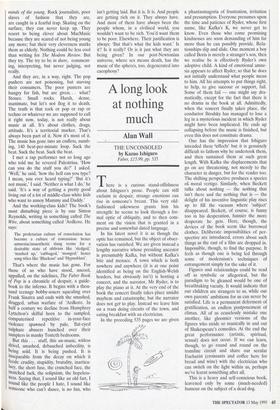A long look at nothing much
Alan Wall
THE UNCONSOLED by Kazuo Ishiguro Faber, £1 5.99, pp. 535 There is a curious stand-offishness about Ishiguro's prose. People can still exclaim in despair, strange emotions can rise in someone's breast. This very old- fashioned askewness grants him his strength: he seems to look through a for- mal optic of obliquity, and to then com- ment on the vision that is granted in a precise and somewhat dated language.
In his latest novel it is as though the optic has remained, but the object of obser- vation has vanished. We are given instead a lengthy narrative whose presiding ancestor is presumably Kafka, but without Kafka's bite and menace. A town which is both nowhere and anywhere (it is at one point identified as being on the English-Welsh borders, but obviously isn't) is hosting a concert, and the narrator, Mr Ryder, is to play the piano at it. At the very end of the book the concert finally takes place amidst mayhem and catastrophe, but the narrator does not get to play. Instead we leave him on a tram doing circuits of the town, and eating breakfast with an electrician.
In the preceding 535 pages we are given a phantasmagoria of frustration, irritation and presumption. Everyone presumes upon the time and patience of Ryder, whose first name, like Kafka's K, we never get to know. Even those who come promising kindnesses are soon demanding of him far more than he can possibly provide. Rela- tionships slip and slide. One moment a boy called Boris is merely a stranger's son, then we realise he is effectively Ryder's own adoptive child. A kind of emotional amne- sia appears to affect Ryder, so that he does not initially understand what people mean to him. All his attempts to put things right, to help, to give succour or support, fail. Some of them fail — one might say dra- matically, except for the fact that there is no drama in the book at all. Admittedly, when the concert finally takes place, the conductor Brodsky has managed to lose 'a leg in a mysterious incident in which Ryder might have been implicated. He ends up collapsing before the music is finished, but even this does not constitute drama.
One has the impression that Ishiguro intended these "effects' but it is genuinely difficult to fathom why he undertook them, and then sustained them at such great length. With Kafka the displacements that go on are threatening, not merely to the character in danger, but for the reader too. The shifting perspective produces a species of- moral vertigo. Similarly, when Beckett talks about nothing — the nothing that isn't there and the nothing that is — the delight of his inventive linguistic play rises up to fill the vacuum where 'subject' disappeared. Beckett, of course, is funny too in his desperation, funnier the more desperate he gets. Here, though, the devices of the book seem like borrowed clothes. Deliberate impossibilities of per- spective are introduced, errors about such things as the cast of a film are dropped in. Impossible, though, to find the purpose. It feels as though one is being led through some of modernism's techniques of estrangement simply for the sake of it.
Figures and relationships could be read off as symbolic or allegorical, but the paradigm to be gleaned would be one of breathtaking vacuity. It would indicate that our children are strangers to us, while our own parents' ambitions for us can never be satisfied. Life is a permanent deferment of gratification, an endless postponement of climax. All of us ceaselessly mistake one another, like gloomier versions of the figures who stride so manically in and out of Shakespeare's comedies. At the end the great performance (artistic, spiritual, sexual) does not occur. If we can learn, though, to go round and round on the tramline circuit and share our secular Eucharist (croissants and coffee here for bread and wine) with the electrician who can switch on the light within us, perhaps we've learnt something after all.
This is a heavy and self-conscious book, leavened only by some (much-needed) humour on the subject of a dead dog.


































































 Previous page
Previous page